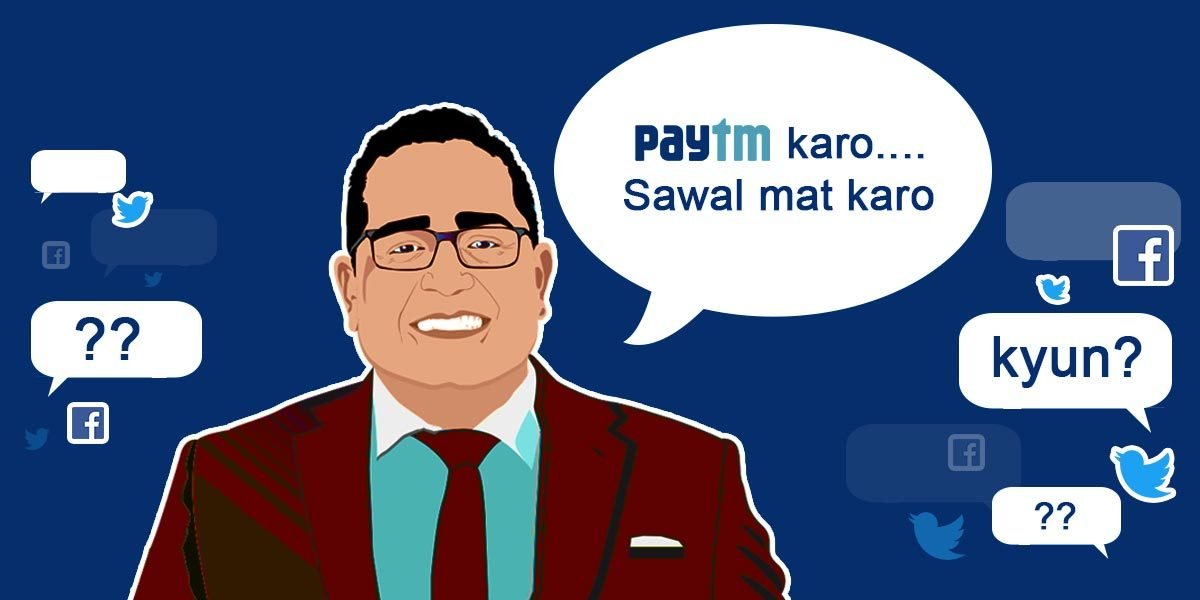Why do we hail startups? The answer is simple – because they challenge the status quo and tend to solve a or many pains for customers. Besides, one of the cores differentiating factors from corporates or traditional companies is superior customer experience, or at the least, more personalised, responsive service.
Over the years, the likes of Flipkart and Amazon have been able to create a superior online shopping experience. Experience along with transparency and trust are must to have traits for startups (irrespective of Decacorn or rupee million worth company) to succeed and remain sexy for decades.
Paytm also played true to this script until recently, with its founder, VSS hyperactive on social media didn’t respond at all on the recent sting by Cobrapost on the company. In the sting, its senior executives and brother of VSS, Ajay Shekhar Sharma boasted about sharing user data at the PMO’s behest to ‘support’ operations in Kashmir has been wanting, to say the least.
Responding to the 13 minutes long video the company has simply denied any data sharing instance with PMO or any other entity, ever.
But, is it enough for the company that claims a staggering 300 million users in India (bigger than Facebook and WhatsApp)? Of course not. Neither from Paytm customer’s point of view nor from any other (analyst, observer or journalist).
While Paytm and its founder Sharma leave no stone unturned when it comes to celebrating a new milestone, partnership or fresh product/feature launches, they chose not to answer a single tweet of outraged users and journalists on the core issue of their users’ privacy.
Meanwhile, in a lazy attempt to reply to the tweetstorm from users, the company has deployed a bot. It’s very sad that the poster child of Indian startup ecosystem is running away from a direct response, and reverting to the template favoured by the very firms it seeks to disrupt.
Instead of a plain vanilla response, Sharma should have answered and explained company’s stand on the sting. At least, the company needed to clarify users concerns through a press conference or other means (Tweet, web conferences etc.).
Interestingly, Sharma didn’t reply to a single tweet from Indian users and journalist. While he didn’t bother to type a response to even a single tweet from India, ironically, he prioritised responding to a random user based out of New York (likely he’s not used Paytm ever).
The disappointing takeaway from this whole affair from a user perspective is not just the question of Paytm’s culpability, which we will hopefully know in the near future. The disappointment should also be about how Paytm has responded to the crisis, and subsequent questions.
A startup that has prided itself on making its Chairman and CEO the virtual face of the firm has chosen to respond with bland press releases and standard denials, rather than Sharma himself, a very active person on social media otherwise, taking up the questions.
It reminds us of the crisis that Volkswagen and Tesla, two contrasting firms in the auto industry faced and how they handled it. While Volkswagen faced confirmed charges of cheating to get high emissions numbers for its vehicles, and ended up paying billions of dollars in fines and lost consumer trust thanks to its false denials and efforts to kill investigations, Tesla, when a person died using one of its vehicles in auto driver mode, saw Elon Must take the stage, and share data and handle every query personally.
To ensure the minimum drop in trust levels with its consumers and investors. Sharma, himself an avowed fan of Musk going by his on social media posts, should do well to remember that Paytm also gets a premium rating from its investors for being different, much like Tesla. Let the Volkswagen type behaviour be left for PSU’s and other firms it is ‘disrupting’.
So while users wonder at the sudden change in communication behaviour which is usually hyper-communicative, the company has fallen back on the old, ‘discredited’ methods of corporates and political parties – keep mum and turn deaf when you are in a soup. Sharma and his company are resorting to such rickety strategy because it still works in India.
Despite all hue and cry and ongoing #deletePaytm campaign, nothing changes for the company. A large section of Paytm’s 300 million user base doesn’t bother about privacy and intensity of financial data theft or leak. Even if they delete, block or uninstall the Alibaba-backed company’s app, Paytm will easily bring them back by offering cashbacks and discounts.
Hope, the fledgling Indian startups must learn from Paytm’s crisis – Please, respect users and understand their concerns. Avoiding users concerns certainly don’t take you far as a company.














